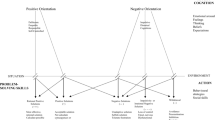Abstract
Relationships between family background problems and social problem solving (SPS) skills were studied in normal third grade children. Twelve urban and suburban classroom teachers provided information about the presence of six family background problems for 243 children. Three problem solving skills were assessed: 1) alternative solution thinking, means-end thinking, and 3) social role taking. Overall, children with, one or more family problems, compared to those with no problems, generated fewer effective solutions and were less able to carry out a stepwise plan or to take the point of view of another. Differential reltionships were found between specific family background problems and specific problem solving skill deficiencies. Implications of the findings for school-based preventive programming were considered.
Similar content being viewed by others
References notes
Shure, M.B. & Spivack, G.Problem solving capacity, social class and adjustment among nursery school children. Paper presented at Eastern Psychological Association, Atlantic City, New Jersey, 1970.
Larcen, L.W., Spivack, G., & Shure, M.Problem solving thinking and adjustment among dependent neglected pre-adolescents. Paper presented at Eastern Psychological Association, Boston, Mass., 1972.
Elardo, P.T. & Caldwell, B. M.An examination of the relationship between role-taking and social competence. Paper presented at Southeastern Conference on Human Development, Nashville, Tennessee, 1976.
Chandler, M.Egocentrism and childhood psychopathology: The development and application of measurement technique. Paper presented at the biennial meeting of the Society for Research in Child Development, Minneapolis, March, 1971.
Spivack, G. & Levine, M.Self-regulation in acting-out and normal adolescents. Report M-4351, Washington, D.C., National Institute of Mental Health, 1963.
References
Bloom, B. L. Prevention of mental disorders: Recent advances in theory and practice.Community Mental Health Journal 1979,15 179–191.
Bloom, B.L., Asher, S.J., & White, S.W. Marital disruption as a stressor: A review and analysis.Pychological Bulletin 1978,85 867–984.
Boike, M., Gesten, E. L., Cowen, E. L., Felner, R. D., & Francis, R. The relationship between family background problems and the school problems and competencies of young normal children.Psychology in the Schools 1978,15 283–290.
Caplan, G.Principles of preventive psychiatry. New York: Basic Books, 1964.
Chandler, M. J. Egocentrism and antisocial behavior: The assessment and training of social perspective-taking skills.Developmental Psychology 1973,9 326–332.
Cowen, E. L., Trost, M. A., Lorion, R. P., Dorr, D., Izzo, L. D., & Isaacson, R. V.New ways in school mental health: Early detection and prevention of school maladaptation. New York: Human Sciences Press, 1975.
Elardo, P. T. & Caldwell, B. M. The effects of an experimental social development program on children in the middle childhood period.Psychology in the Schools 1979,16 93–100.
Felner, R. D., Farber, S. S., & Primavera, J. Children of divorce, stressful life events and transitions: A framework for preventive efforts. In R. H. Price, R. F. Ketterer, B. C. Bader, & J. Monahan (Eds.),Prevention in mental health: Research, policy and practice. Beverly Hills, CA: Sage Publications, 1980.
Felner, R. D., Norton, P. L., Cowen, E. L., & Farber, S. S. A prevention program for children experiencing life crisis.Professional Psychology 1981,12 446–452.
Felner, R. D., Stolberg, A. L., & Cowen, E. L. Crisis events and school mental health referral patterns of young children.Journal of Consulting and Clinical Psychology 1975,43 305–310.
Gesten, E. L., Scher, K., & Cowen, E. L. Judged school problems and competencies of referred children with varying family background characteristics.Journal of Abnormal Child Psychology 1978,6 247–255.
Hetherington, E. M., Cox, M., & Cox, R. The aftermath of divorce. In J. H. Stevens & M. Matthews (Eds.),Mother/child, father/child relationships. Washington, D.C.: National Association for the Education of Young Children, 1978.
Lindemann, E. The meaning of crisis in individual and family living.Teachers College Record 1956,57 310–315.
Lorion, R. P., Cowen, E. L., & Caldwell, R. A. Normative and parametric analyses of school maladjustment.American Journal of Community Psychology 1975,3 293–301.
Lorion, R. P., Cowen, E. L., Kraus, R. M., & Milling, L. S. Familial correlates of school maladjustment.Journal of Community Psychology 1977,5 142–148.
McCall, R. B., & Stocking, S.H.A summary of research about the effects of divorce on families. Boys Town, NE: The Boys Town Center for the Study of Youth Development, 1980.
Platt, J., Scura, W., & Hannon, J. Problem solving thinking of youthful heroin addicts.Journal of Community Psychology 1973,1 278–281.
Platt, J., & Spivack, G. Studies in problem solving thinking of psychiatric patients.Proceedings of the 81st Annual Convention of the American Psychological Association 1973,8 461–462.
Shure, M. B. & Spivack, G.Cognitive problem solving skills, adjustment and social class. Research and Evaluation Report #26. Philadelphia: Department of Mental Health Sciences, Hahnemann Community Mental Health/Mental Retardation Center, 1970.
Shure, M. B. & Spivack, G. Means-end thinking, adjustment and social class among elementary school aged children.Journal of Consulting and Clinical Psychology, 1972, 38 348–353.
Shure, M. B. & Spivack, G.Problem solving techniques in childrearing. San Francisco, CA: Jossey-Bass, 1978.
Shure, M. B., Spivack, G., & Jaeger, M. Problem solving thinking and adjustment among disadvantaged preschool children.Child Development 1971,42 1791–1803.
Spivack, G., Platt, J. J., & Shure, M. B.The problem solving approach to adjustment. San Francisco, CA: Jossey-Bass, 1976.
Spivack, G. & Shure, M.Social adjustment of young children. San Francisco, CA: Jossey-Bass, 1974.
Weissberg, R. P., Gesten, E. L., Rapkin, B. D., Cowen, E. L., Davidson, E., Flores de Apodaca, R., & McKim, B. J. The evaluation of a social problem solving training program for suburban and inner-city third grade children.Journal of Consulting and Clinical Psychology 1981,49 251–261.
Additional information
This study was done with grant support from the N.Y.S. Education Department and the NIMH Experimental and Special Training Branch MH 14547-02. The authors acknowledge that support with gratitude. Reprint requests to the 3rd author, Department of Psychology, University of Rochester, Rochester, N.Y. 14627. Viviane Perez is now at the Jerusalem Psychoeducational Clinic, Jerusalem, Israel. Ellis L. Gesten is presently at the University of South Florida, Tampa, Florida. Bruce Rapkin is now at the Department of Psychology, University of Illinois, Champaign, Illinois.
Rights and permissions
About this article
Cite this article
Perez, V., Gesten, E.L., Cowen, E.L. et al. Relationships between family background problems and social problem solving skills of young normal children. J Primary Prevent 2, 80–90 (1981). https://doi.org/10.1007/BF01333745
Issue Date:
DOI: https://doi.org/10.1007/BF01333745




